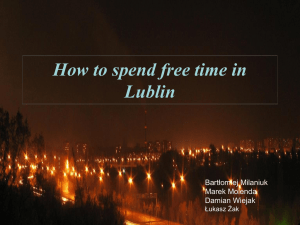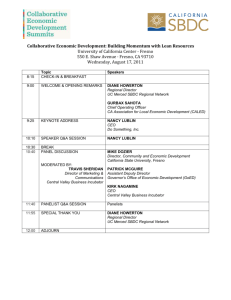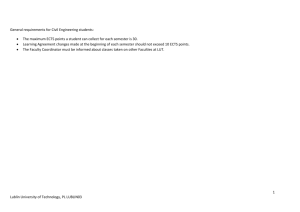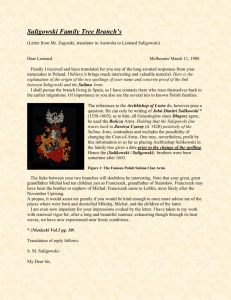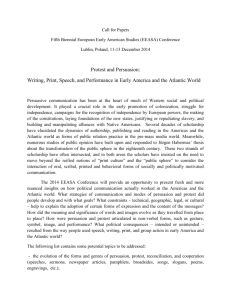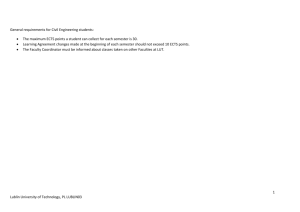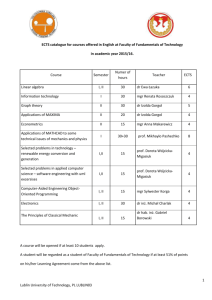Lublin citizens' participation in culture and their
advertisement
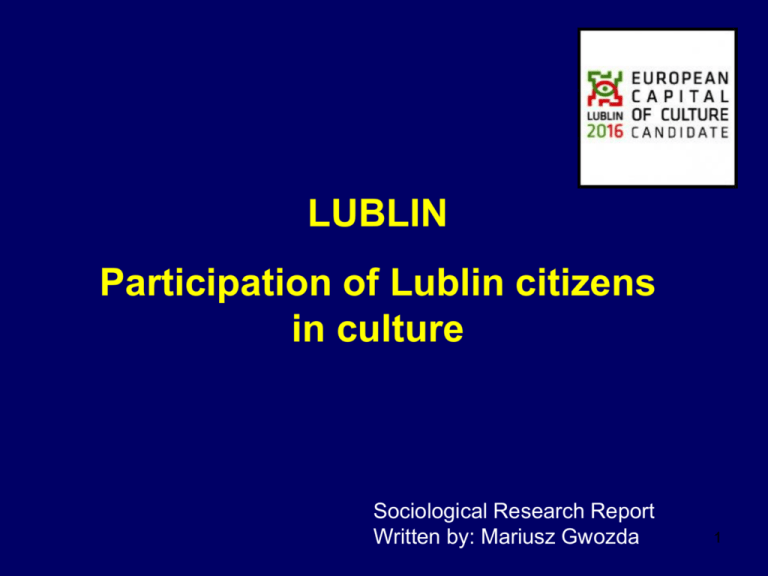
LUBLIN Participation of Lublin citizens in culture Sociological Research Report Written by: Mariusz Gwozda 1 Lublin citizens’ participation in culture and their knowledge of the city’s cultural life How often do you take part in the following events in Lublin? (data in percentage) 1 – more than once a week; 2 – once a week; 3 – a few times in a month; 4 – once a month; 5 – a few times in a year; 6 – once a year; 7 – very occasionally; 8 – do not participate at all; 9 – hard to say; (N=1397) 1 2 3 4 5 6 7 8 9 Folk festivals 1,3 2,7 2,9 22,6 23,9 14,2 25,4 7,0 0,0 Sport events 3,2 7,3 5,2 21,4 15,3 12,6 29,9 5,3 0,0 Concerts (other than classical music) 1,5 5,7 10,5 41,4 12,2 6,9 19,1 2,8 0,0 Classical music concerts 0,9 1,0 2,4 9,9 11,1 13,3 53,7 7,7 0,0 Lectures 1,2 1,6 3,2 13,0 8,2 10,8 52,8 9,2 0,0 Art exhibitions 0,7 2,2 3,1 15,6 13,8 14,9 44,7 5,0 0,0 Parties, social gatherings, get-togethers 14,4 28,9 21,6 23,8 3,8 1,5 4,1 1,9 0,0 Clubs, discos 5,5 17,1 16,5 18,9 5,0 4,8 29,2 3,0 0,0 Cinema 2,0 9,4 20,8 38,3 10,1 6,0 11,3 2,2 0,0 Pubs, restaurans, cafes 15,9 27,6 17,7 20,1 3,4 3,6 9,8 2,0 0,0 Theatre 0,8 2,3 4,7 18,4 17,4 15,7 33,6 7,1 0,0 Participation of Lublin citizens in culture (Sociological Research Report), Department of Sociology of Culture and Education MCSU, Lublin 2009. 2 Lublin citizens’ participation in culture and their knowledge of the city’s cultural life The least popular forms of participation in institutionalized forms of cultural life are classical music concerts, lectures and art exhibitions. More than half of the respondents declare occasional contact with these forms of cultural life or show no interest in them whatsoever. Theatre, folk and sport events got similar results. Almost half of the respondents admitted hat they participate in such events occasionally. Most often, as expected, people take part in social gatherings and parties. Almost nine out of then respondents (88,7%) admit to participate in such get-togethers at least once a month. Furthermore, Lublin citizens usually choose pubs and restaurants (once a month and more – 81,3%), cinema (70,5%) and concerts of music other than classical (59,1%). Participation of Lublin citizens in culture (Sociological Research Report), Department of Sociology of Culture and Education MCSU, Lublin 2009. 3 Lublin citizens’ participation in culture and their knowledge of the city’s cultural life Popularity of certain forms of culture is determined by different socio-demographic factors. Social gatherings are common among those respondents who where defined as average Lublin citizens, with secondary education. This form of leisure is most popular among women. People who most likely go to cinema are the once more prone to culture consumption (respondents defined as „connoisseurs”) as well as students and school children. The audience of other than classical music concerts consists of people aged 15 – 31 years old, school children and students. Participation of Lublin citizens in culture (Sociological Research Report), Department of Sociology of 4 Culture and Education MCSU, Lublin 2009. Lublin citizens’ participation in culture and their knowledge of the city’s cultural life Did you actively participate in cultural events organized in Lublin over the last year? 1 – yes (N=1182) 2 – no (percentage) 1 2 Yes, as a viewer/ participant 94,1 5,9 Yes, as a „leader” of a group of friends taking them to a party 40,6 59,4 Yes, as an organizer/ co-organizer of the event 14,0 86,0 Yes, as a performer during to event 12,4 87,6 Yes, as a security guard 2,4 97,6 Yes, in other way 1,2 98,8 Participation of Lublin citizens in culture (Sociological Research Report), Department of Sociology of Culture and Education MCSU, Lublin 2009. 5 Lublin citizens’ participation in culture and their knowledge of the city’s cultural life As expected, people’s contact with culture usually comes down to participation in the event and reception of its content. Over the last year 94,1% of the respondents took part in the cultural events as a viewer/ participant. Almost every second respondent (40,6%) took part in the events as a „leader” gathering the group of friends to go out. Much less people were involved in organization of a cultural event itself or participated in it as a performer (both forms represent active participation). This way of involvement was declared accordingly 14,0% and 12,4 % of people. Participation of Lublin citizens in culture (Sociological Research Report), Department of Sociology of Culture and Education MCSU, Lublin 2009. 6 Lublin citizens’ participation in culture and their knowledge of the city’s cultural life Which of the following places do you visit the most often as venues of cultural events? (N=1397) (%) City centre (the Old Town, Krakowskie Przedmieście, The Castle Square, Litewski Square, the promenade, shopping centre „Plaza”) 17,6 Cinemas 14,5 Theatres, Lublin Philharmonic (Juliusz Osterwa Theatre, Music Theatre, H. Ch. Andersen Theatre) 10,2 University Campus (Cultural Center „Chatka Żaka”, residence halls) 9,3 Parks and green areas (The Saski Garden, Botanic Garden, band shell, Zemborzycki reservoir, Open Air Village Museum) 7,3 Clubs and pubs 7,1 Music clubs 6,2 Cultural centres, community clubs (LOK, BWA) 4,2 Sports facilities (Globus, RKS Motor, Start, MOSiR) 3,7 Disco clubs 2,9 District community events 1,2 Other places (churches, museums, fairs, restaurants, cefes) 1, 5 Hard to say 14,3 Total 100 Participation of Lublin citizens in culture (Sociological Research Report), Department of Sociology of Culture and Education MCSU, Lublin 2009. 7 Lublin citizens’ participation in culture and their knowledge of the city’s cultural life The respondents usually visit places and institutions located in socalled city centre. Almost every fifth person interviewed chose such location. In this context, the following places were listed: the Old Town and the nearby street Krakowskie Przedmieście, Castle Square, Litewski Square, promenade near the Cracow Gate and shopping centre „Plaza”. Every seventh respondent mentioned cinemas – 14,5%, whereas every ten pointed out theatres and Lublin Philharmonic – 10,2% as well as university campus – 9,3%. Other places mentioned here are: parks, clubc and pubs, music clubs, cultural centres and sport facilities. However, every seventh respondent did not select any of the places – 14,3% („hard to say” variant). Participation of Lublin citizens in culture (Sociological Research Report), Department of Sociology of Culture and Education MCSU, Lublin 2009. 8 Lublin citizens’ participation in culture and their knowledge of the city’s cultural life Motives behind participation in cultural events Entertainment 18,2% 35,9% 3,0% Spending time with friends, meeting new people Personal interests 8,6% Leisure, relax 16,6% 17,7% Other reasons (cheap tickets, close proximity to one's home, great atmosphere, alcohol) Hard to say Participation of Lublin citizens in culture (Sociological Research Report), Department of Sociology of 9 Culture and Education MCSU, Lublin 2009. Lublin citizens’ participation in culture and their knowledge of the city’s cultural life According to the interviewed citizens, the most important reason behind participation in cultural life is simply entertainment. This option was chosen by over one third of the respondents (35,9%) asked about the causes of participation in cultural events. Other motives were: a need for spending time with friends and meeting new people (17,7%) as well as personal interest in particular events (16,6%). Almost every twentieth respondent mentioned a need for leisure and relax – 8,6%. Participation of Lublin citizens in culture (Sociological Research Report), Department of Sociology of Culture and Education MCSU, Lublin 2009. 10 Lublin citizens’ participation in culture and their knowledge of the city’s cultural life Where do you find information about cultural events organized in Lublin? (N=1397) (percentage) 1 – yes 2 – no 3 – I am not interested 1 2 3 Posters/ billboards/ flyers 62,7 34,1 3,2 Family/ friends 56,6 40,2 3,2 Newspapers/ magazines (Kurier Lubelski, Moje Miasto Lublin, Dziennik Wschodni, ZOOM, Gazeta Wyborcza) 45,2 51,7 3,2 The Internet (koziolek.pl, lublin2016.pl, student.pl, lublin.eu) 44,3 52,5 3,2 Radio (Eska, Centrum, Radio Lublin) 41,8 55,0 3,2 Local TV station 34,7 62,1 3,2 Public TV stations (TVN, TVP1, Trwam, TVP2, Polsat) 6,1 90,7 3,2 Other 1,2 95,6 3,2 * The results do not add up to 100%, as the respondents could choose more than one answer. Participation of Lublin citizens in culture (Sociological Research Report), Department of Sociology of 11 Culture and Education MCSU, Lublin 2009. Lublin citizens’ participation in culture and their knowledge of the city’s cultural life The data gathered show that people find information about cultural events in Lublin mostly in official streams of information such as posters, billboards and flyers. Other sources of information are friends and family. Later, the respondents mentioned newspapers and magazines (in the following order: Kurier Lubelski, Moje Miasto Lublin, Dziennik Wschodni, ZOOM, Gazeta Wyborcza), web portals (as follows: koziolek.pl, lublin2016.pl, student.pl, lublin.eu) and radios (in the following order: Radio Eska, Akademickie Radio Centrum, Radio Lublin). The respondents selected local and public TV stations as the least popular sources of information about cultural events in Lublin. Participation of Lublin citizens in culture (Sociological Research Report), Department of Sociology of 12 Culture and Education MCSU, Lublin 2009. Lublin citizens’ participation in culture and their knowledge of the city’s cultural life What are, in your opinion, the most important cultural events that took place in Lublin over the last year? (between June 2008 and June 2009) (N=1397) (%) Students Culture Days 36,4 The Night of Culture 15,8 Concerts (A.M. Jopek, Kult, T. Stańko, Audiofeels, WOSP, New Year’s Eve concert) 5,9 Plays (La Traviata, The Emigrants, The Haunted Manor, Metro) 5,1 Sport events (Tur de Pologne, football and handball matches) 3,2 Festivals („Other Sounds” Art’n’Music Festival, The International Organ Festival, „City of Poetry” Literary Festival 2,8 Other events (fairs, meetings with authors, visits of diplomats and politicians) 2,8 International Film Festival „Crossroads of Europe” 2,3 Film shows, reviews and festivals 2,0 Celebrations of national holidays (440th anniversary of the Union of Lublin, celebrations of the 3rd May and 11th November) 1,3 Jagiellonian Fair 1,1 Hard to say 21,3 Total 100 Participation of Lublin citizens in culture (Sociological Research Report), Department of Sociology of Culture and Education MCSU, Lublin 2009. 13 Lublin citizens’ participation in culture and their knowledge of the city’s cultural life Cultural infrastructure deficiencies on the level of the city As it turned out, almost a half of the respondents did not give a specific answer to the question – 44%. It can be pointed out that those are people who accept the current situation or have no actual insights concerning this issue. The rest of the respondents highlighted lacks of sports facilities – 12,7%. As expected, the most important issue here is construction of the stadium in the city. Among the detailed answers related to sport infrastructure, the researchers found the following suggestions: stadium, aqua park, skate park, swimming pool, golf course, pitches. Secondly, the respondents listed institutions promoting higher culture. Every tenth of the interviewed people selected opera house and concert hall for philharmonic orchestras – 9,6%, while theatre was mentioned by 6,9% respondents. Participation of Lublin citizens in culture (Sociological Research Report), Department of Sociology of Culture and Education MCSU, Lublin 2009. 14 Lublin citizens’ participation in culture and their knowledge of the city’s cultural life Cultural infrastructure deficiencies on the level of the districts cinema 19,0% 39,3% pub, restaurant, cafe sport facility 10,3% community culture centre (music centre, library, centres for children) it needs everything it does not need any institutions theatre 9,0% other (a senior citizens'club, park, gallery, monument, health spa, concert hall, disco) 5,8% 7,8% hard to say 2,6% 2,7% 3,5% Participation of Lublin citizens in culture (Sociological Research Report), Department of Sociology of 15 Culture and Education MCSU, Lublin 2009. Lublin citizens’ participation in culture and their knowledge of the city’s cultural life It turned out that quite high percentage of the interviewed people (39,3%) did not provide any details concerning their districts. They are not, however, dissatisfied people, as the research shows only 3,5% discontent people who chose „it needs everything” option. Those who precisely described the districts’ needs selected in the first place lack of cinemas (19%), pubs, restaurants and cafes (10,3%) as well as sports facilities (9%). Later, community culture centres were mentioned (7,8%), understood as music centres, libraries, centres for children. Participation of Lublin citizens in culture (Sociological Research Report), Department of Sociology of Culture and Education MCSU, Lublin 2009. 16 Lublin citizens’ participation in culture and their knowledge of the city’s cultural life The respondents were also asked to express their opinions about the role of culture as one of the elements in the process of the city’s development. 90,1 % people are convinced that culture is an important factor in Lublin’s development. 3,9% of the interviewed people do not agree with this opinion. Popularization, organization and exposition of culture are regarded as activities which can contribute to positive image of the city in Polish and European eyes. This, in turn, may contribute to the citizens’ quality of life, since a city focused on culture is more attractive for both its citizens and tourists. Culture also builds stronger relation with the dwelling place, which, in long run, improves the image of the city. Participation of Lublin citizens in culture (Sociological Research Report), Department of Sociology of Culture and Education MCSU, Lublin 2009. 17 Lublin citizens’ participation in culture and their knowledge of the city’s cultural life Summary: - The citizens’ preferences for various forms of culture indicate popular and mass character of culture. - Interest and participation in higher culture is declared only by a very small number of people (almost half of the respondents admit that they do not go to classical music concerts, lectures or art galleries at all). - The respondents usually take part in social gatherings and parties, spend their leisure time in pubs and restaurants and go to the cinema or concerts of other than classical music. - The most important cultural events organized in Lublin before June 2009 were: Student Culture Days, The Night of Culture, concerts of famous artists A.M. Jopek, Kult, T. Stanko, Audiofeels, WOSP, New Year’s Eva concert), plays (La Traviata, The Emigrants, The Haunted Manor, Metro) and sport events (Tour de Pologne, football and handball matches). Participation of Lublin citizens in culture (Sociological Research Report), Department of Sociology of 18 Culture and Education MCSU, Lublin 2009. Lublin citizens’ participation in culture and their knowledge of the city’s cultural life - The respondents know about cultural events organized in Lublin mostly from official streams of information such as: posters, billboards and flyers, then family and friends, newspapers and magazines, web portals and radio stations. - Among deficiencies of the city’s cultural institutions, the respondents above all listed poor sport infrastructure, lack of opera house, concert hall for philharmonic orchestra and theatres. - On the level of districts and neighborhoods, however, the respondents mentioned lack of cinemas, pubs, restaurants, cafes and sport facilities. There were also listed community culture centres, music centres, libraries and centres for children. Participation of Lublin citizens in culture (Sociological Research Report), Department of Sociology of Culture and Education MCSU, Lublin 2009. 19 Lublin citizens’ participation in culture and their knowledge of the city’s cultural life - In all the contexts discussed, there was more favorable opinions than the negative ones describing the changes of the city’s cultural offer which took place over the last year (availability of the events, variety, quality, quantity, information about the events) - from 6% to 13% discontented people and as much as 39% up to 47% satisfied. - Nine out of the respondents (90,1%) is convinced that culture is an important factor in Lublin’s development. Only 3,9% of the interviewed people shares opposite views. Participation of Lublin citizens in culture (Sociological Research Report), Department of Sociology of 20 Culture and Education MCSU, Lublin 2009. Lublin – Multicultural city For many centuries national and religious minorities have been present in Lublin’s history. By its dissimilarity of religion and customs, this important element of the past has largely influenced the city’s image. Even today it is an important part of Lublin’s cultural landscape. Participation of Lublin citizens in culture (Sociological Research Report), Department of Sociology of Culture and Education MCSU, Lublin 2009. 21 Lublin – Multicultural city According to the materials gathered, exactly half of the respondents (50,4%) declared knowledge of multicultural and religious history of the city. This group mostly consists of „connoisseurs of culture” and average citizens (secondary school children and students are in minority), middle aged respondents and the elders, as well as higher educated people. Participation of Lublin citizens in culture (Sociological Research Report), Department of Sociology of 22 Culture and Education MCSU, Lublin 2009. Lublin – Multicultural city What places in Lublin are related to other nationalities or religions and what facts or situations do they remind of? (N=687) Nationality/religion: (%) What facts or situations do they remind of? The Jewish 69,5 State Museum at Majdanek, former citizens of the Old Town, The Jewish Cemetery, holocaust, persecutions The Lithuanians 14,7 The Union of Lublin The Ukrainians 4,3 Orthodox churches, the WW2, persecutions Members of the Orthodox Church 3,2 Orthodox churches The Germans 3,0 The WW2, place of worship, Museum at Majdanek The Russians 2,3 The Old Town, the WW2 Others (the Tatars, the Americans, the Arabs, the Romanians, the Christians) 3,0 Former citizens of the Old Town, the WW2 Total 100 ---- Participation of Lublin citizens in culture (Sociological Research Report), Department of Sociology of 23 Culture and Education MCSU, Lublin 2009. Lublin – Multicultural city Places in contemporary Lublin associated with other cultures and religions (N=745) (%) Places of religious worship (churches, synagogues) 24,6 The camp and the Museum at Majdanek 19,6 The Jewish Cemetery 18,4 The Old Town 8,4 Chachmei Lublin Yeshiva 7,2 The Castle 4,3 The NN Theatre 4,0 Litewski Square 2,6 Jewish tenement houses 2,4 Other (Centre of Jewish Culture, cemetery on Lipowa St., monuments, Grodzka Gate, frescoes in the Castle, the Trail of the Lublin Jews, pubs and restaurants: Zydowska, Irish Pub, Mc Donald’s) 8,7 * The results do not add up to 100%, as the respondents could choose more than one answer. Participation of Lublin citizens in culture (Sociological Research Report), Department of Sociology of 24 Culture and Education MCSU, Lublin 2009. Lublin – Multicultural city Multicultural Lublin, as it was mentioned before, is a project which emphasizes and promotes tolerance and intercultural dialogue. That is why respondents were asked about events promoting culture of a different nation or religion which were organized over the last year in Lublin. Every third respondent (37,3%) knows that some events promoting different culture took place in Lublin. 8,8% expressed the opposite opinion. However, over half of Lublin citizens (54,0%) find it difficult to answer this question. This fact can be interpreted as either lack of interest in this area or insufficient promotion campaign. Participation of Lublin citizens in culture (Sociological Research Report), Department of Sociology of 25 Culture and Education MCSU, Lublin 2009. Lublin – Multicultural city The respondents who declared their interest in this topic were asked about their participation in the events. Therefore, from a group of 514 people aware of the events promoting different culture in Lublin over the last year, 32,2% confirmed their participation. Two third did not take part in the events – 64,1% and 3,7% found it hard to determine precisely their participation. Participation of Lublin citizens in culture (Sociological Research Report), Department of Sociology of Culture and Education MCSU, Lublin 2009. 26 Lublin – Multicultural city People, who declared their knowledge of the events presenting culture of a different nation or religion held in the city were asked to name them. There were several examples mentioned. The most popular answers were: International Film Festivals „Crossroads of Europe”, Ukraine Culture Days, International Days of Folklore, Jagiellonian Fair. Participation of Lublin citizens in culture (Sociological Research Report), Department of Sociology of 27 Culture and Education MCSU, Lublin 2009. Lublin – Multicultural city Events promoting culture of a different nation or religion organized in Lublin (N=514) (%) International Film Festivals „Crossroads of Europe” 18,3 Ukraine Culture Days 15,9 International Days of Folklore 12,8 Jagiellonian Fair 10,3 Festival of Jewish culture 6,9 Central Europe Theatre Festival „The Neighbours” 4,5 Symposia and conferences 4,5 Festival of Dialogue of Four Cultures 2,8 Other (happenings, concerts, stage and musical performances, International Organ Festival, „Mikołajki Folkowe” International Folk Festival, Ukrainian Night, way of the Cross at Majdanek, Student Culture Days) 24,1 Total 100 Participation of Lublin citizens in culture (Sociological Research Report), Department of Sociology of 28 Culture and Education MCSU, Lublin 2009. Lublin – Multicultural city What nationalities do you nowadays see in Lublin? 1,6% The Ukrainians 1,3% 1,6% 1,7% The Americans The Africans 5,5% 2,0% The Romanians The Russians 19,1% 2,1% The Indians The Romani 2,8% 3,4% 9,2% 3,5% The Byelorussians The Turks The Arabs The Israeli The Chinese 3,7% 4,1% 7,6% 4,1% 6,7% 4,4% 5,7% 4,5% 5,4% The Germans The British TheChechens The Asians The Koreans The Vietnamese The Bulgarians The Japanese Others Participation of Lublin citizens in culture (Sociological Research Report), Department of Sociology of Culture and Education MCSU, Lublin 2009. 29 Lublin – Multicultural city What nationalities do you spot nowadays in Lublin? Where?/ In what places? The Israeli Historical places, necropolises The Chinese Places of trade, universities The Germans Historical places, necropolises, entertainment places, „in the city”, The Ukrainians Places of trade, universities, neighbourhoods The Americans Entertainment places, universities, neighbourhoods The British Entertainment places, „in the city”, universities The Africans „in the city”, entertainment places, universities The Chechens Historical places, necropolises, entertainment places, neighbourhoods, „in the city” The Romanians „in the city”, places of trade, neighbourhoods The Asians Catering, entertainment places The Russians Places of trade, catering The Koreans Entertainment places, places of trade The Indians Entertainment places, „in the city”, universities The Vietnamese Places of trade, neighbourhoods, catering The Romani Neighbourhoods, „in the city” The Bulgarians The Byelorussians Places of trade, universities, neighbourhoods Neighbourhoods, places of trade, universities The Japanese Neighbourhoods, „in the city”, universities Other nationalities Neighbourhoods, universities, entertainment places The Turks Catering The Arabs Catering, entertainment places Participation of Lublin citizens in culture (Sociological Research Report), Department of Sociology of Culture and Education MCSU, Lublin 2009. 30 Lublin – Multicultural city The places in Lublin where foreigners’ presence is noticed are above all schools and universities. Then, respondents suggested that the foreigners are simply their closer ore more distant neighbours. Paid work in „places of trade” and „catering” are next options mentioned in the context of places where other nationalities are seen. Other categories found in the survey are „entertainment places”, that is places where people spend their free time, „in the city” – not specified public spaces, as well as places associated with worship and commemoration, necropolises, museums, places of tradition and martyrdom. Participation of Lublin citizens in culture (Sociological Research Report), Department of Sociology of 31 Culture and Education MCSU, Lublin 2009. Lublin – Multicultural city What nationalities do you notice nowadays in Lublin? (N=1145) What do they do? The Israeli travel The Chinese Study, work, trade, party The Germans travel The British Travel, party The Ukrainians Work, trade, live, study The Americans Study, party The Chechens Live, beg The Africans Party, study, live, The Asians Work, trade, live, party The Romanians beg The Koreans Live, work, trade, party The Russians Work, trade, live The Vietnamese Live, work, trade The Indians Party, study The Bulgarians Work, trade, travel, study The Romani Beg, live The Japanese Travel, study The Byelorussians Study, live Other nationalities Live, party, study The Turks Work, trade, study The Arabs Party, live, work, trade Participation of Lublin citizens in culture (Sociological Research Report), Department of Sociology of Culture and Education MCSU, Lublin 2009. 32 Lublin – Multicultural city According to the data above, the foreigners have become a natural element of Lublin’s social landscape. They are not distant and exotic people any more, as they used to be two decades ago. Their presence is associated mostly with places and types of activity improving their qualifications („universities”, „study”) and paid work („places of trade”, „catering”). However, people also acknowledge their presence because the foreigners live in the same neighbourhoods. In fact, it is optimistic news, since nothing overcomes stereotypes as direct contact. Participation of Lublin citizens in culture (Sociological Research Report), Department of Sociology of 33 Culture and Education MCSU, Lublin 2009. Lublin – Multicultural city Summary: - According to the citizens, Lublin is a multicultural city in terms of tradition and contemporary reality. - Over a half of the respondents values the city's rich tradition and associates in with multicultural character of this heritage. - Most of the people notice in their social environment the presence of other nationalities and religions. - They present open attitude and general acceptance towards the foreigners. - When describing the foreigners’ presence in their social environment, they mostly use favourable arguments. - Every third respondent stated that he knows about cultural events promoting ethnic and religious minorities organized in Lublin. - Over one third of people see in the multicultural character of the city an opportunity for development. Participation of Lublin citizens in culture (Sociological Research Report), Department of Sociology of 34 Culture and Education MCSU, Lublin 2009. Lublin – European Capital of Culture 2016 From among 1397 respondents almost three fourth (72,2%) know that Lublin is taking part in the competition for the title of European Capital of Culture 2016. Participation of Lublin citizens in culture (Sociological Research Report), Department of Sociology of 35 Culture and Education MCSU, Lublin 2009. Lublin – European Capital of Culture 2016 Where did you find information about Lublin’s candidature for ECC 2016? (N=995) The respondents could select more than one source (%) Posters/ billboards/ flyers 51 Family/ friends 29 Newspapers/ magazines (Kurier Lubelski, Dziennik Wschodni, Moje Miasto Lublin, Gazeta Wyborcza, ZOOM) 29 Local TV station 27 The Internet (lublin2016.pl, koziolek.pl, lublin.eu, kurierlubelski.pl, mmlublin.pl, onet.pl, wp.pl, gazeta.pl) 21 Radio Radio Lublin, Centrum, Eska, Radio Zet, Złote Przeboje 17 Public TV stations TVN, TVP1, Trwam 5 * The results do not add up to 100%, as the respondents could choose more than one answer. Participation of Lublin citizens in culture (Sociological Research Report), Department of Sociology of 36 Culture and Education MCSU, Lublin 2009. Lublin – European Capital of Culture 2016 The idea of Lublin as European Capital of Culture 2016 was accepted by most of Lublin citizens. Eight out of ten respondents (86,0%) speak in favour of this project. Furthermore, over a half of the respondents (55,2%) declare their explicit support for this idea. Only a small part of Lublin citizens was less enthusiastic. Every ten respondent (10,8%) was uninterested in this matter and only 3,1% share negative opinion. Participation of Lublin citizens in culture (Sociological Research Report), Department of Sociology of 37 Culture and Education MCSU, Lublin 2009. Lublin – European Capital of Culture 2016 What are Lublin strengths that can contribute to winning the title of European Capital of Culture? (N=1397) (%) University character of the city (universities, students, young people) 21,9 Architecture and sights (Old Town) 20,1 Culture (tolerance and open attitude, extensive tradition, multiculturalism, regional culture) 11,3 Geographical location (Gate of the East, eastern metropolis, the centre of Europe) 6,9 The history of the city 3,6 Infrastructure (airport under construction, green areas, modernization of roads, hotels, shopping centres) 2,2 Cultural events 1,6 Lack of strengths 0,9 Promotion of the city (international publicity, the Municipality’s efforts) 0,8 Other (Lublin has never organized such a big event, the weather, fresh, air, tourists, slower pace of life, the citizens) 3,8 Hard to say 26,8 Total 100 Participation of Lublin citizens in culture (Sociological Research Report), Department of Sociology of 38 Culture and Education MCSU, Lublin 2009. Lublin – European Capital of Culture 2016 What are Lublin’s weaknesses that can hinder the winning of the European Capital of Culture title? (N=1397) (%) Road infrastructure of the city and public transport (bad connection to the city centre, traffic jams, bad location of the bus station, lack of new bus links within the city, no underground, insufficient parking spaces) 23,3 Promotion of the city (insufficient contacts with other countries and cities, lack of ideas for promotion, unsatisfactory promotion in Poland and abroad, inefficient authorities, no plan of development) 11,7 The city’s offer (lack of hotels, uninteresting architecture, squalid neighbourhoods) 10,1 Economy (unused EU financial resources, unemployment, lack of industrial initiatives, impoverished region, slow development of the region) 8,9 Geographical location 4,4 Communication infrastructure outside the city (no bypass or airport) 4,0 The citizens (intolerance, the citizens' lack of initiative, youth subcultures) 3,7 There are no weaknesses 0,3 Other (dirty streets, „no atmosphere”, crime, too few different than cultural events, too few concerts of „big stars”, poor sport infrastructure) 8,6 Hard to say 25,0 Total 100 Participation of Lublin citizens in culture (Sociological Research Report), Department of Sociology of 39 Culture and Education MCSU, Lublin 2009. Lublin – European Capital of Culture 2016 Summary: - The data gathered show a sufficient level of knowledge and high level of acceptance for the idea of Lublin’s participation in the European Capital of Culture 2016. - The promotional campaign and steps taken to enhance the awareness of the ECC 2016 are realized the most successfully with the use of formal means of communication. People mostly find the information on billboards, flyers and posters. - There was no significant difference between favourable and negative opinions about Lublin’s assets and drawbacks in the run for the ECC 2016. - According to the respondents, the strengths related to university character of the city, architectural qualities and extensive tradition should be emphasized when promoting Lublin. Participation of Lublin citizens in culture (Sociological Research Report), Department of Sociology of 40 Culture and Education MCSU, Lublin 2009.
